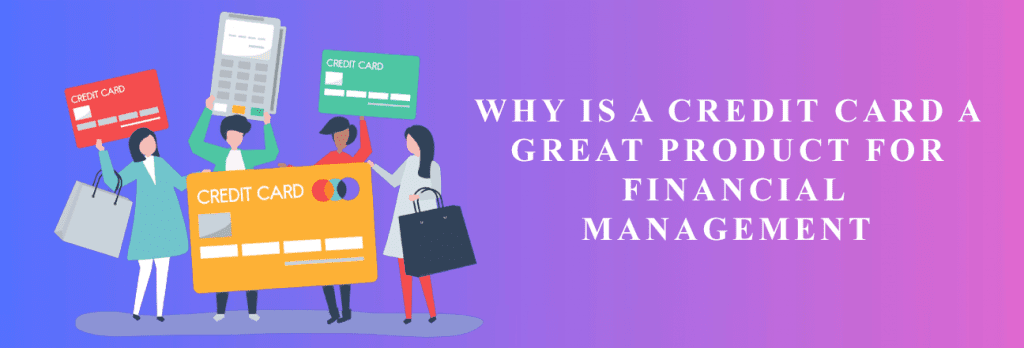Why Is A Credit Card A Great Product For Financial Management

In the world of personal finance, the credit card often gets a bad rap. Many individuals associate credit cards with debt, overspending, and financial pitfalls. However, it’s crucial to recognize that a credit card can be an incredibly powerful tool for financial management when used responsibly. In this blog post, we will delve into the reasons why a credit card is an excellent product for financial management and explore how DSAs can educate their clients on harnessing its potential wisely.
Why A Credit Card Could Be Great For Financial Management
As mentioned, a credit card can be a really good tool for financial management if it is used responsibly. Here’s how it helps:
Building Credit History and Score:
One of the most significant advantages of using a credit card is its impact on your credit history and credit score. Credit history is essential because it provides potential lenders, landlords, and even employers with a snapshot of your financial responsibility. A good credit score can open doors to favorable interest rates on loans and better financial opportunities.
For individuals who are just starting to build their credit history, a credit card is often the first step. By making regular, on-time payments and maintaining a low credit utilization rate, individuals can improve their credit score and build a positive credit history. DSAs can emphasize this point to their clients, particularly young adults and those with limited credit histories.
Convenience and Security:
Credit cards offer unparalleled convenience when it comes to managing expenses. They allow you to make purchases online and in person without carrying large sums of cash. Credit cards also protect against fraud and unauthorized transactions. In case of a dispute, most credit card companies offer robust chargeback protection.
For DSA Partner, promoting this aspect of credit cards can help clients feel more secure about their financial transactions. Emphasizing the convenience and security features of credit cards can encourage clients to use them for everyday expenses.
Budget Tracking:
One of the critical components of effective financial management is budgeting. Credit cards can be a valuable tool for tracking and managing your expenses. Most credit card companies provide detailed monthly statements, breaking down your spending by category. This feature can help clients identify areas where they might be overspending and make necessary adjustments to their budget.
DSAs should educate clients on how to utilize credit card statements to gain insights into their spending habits. By tracking their expenses, clients can make informed decisions and stick to their financial goals.
Rewards and Cashback:
Credit card rewards programs are a powerful incentive for responsible credit card usage. Many credit cards offer cashback, miles, or points that can be redeemed for various benefits. DSAs can guide their clients in selecting credit cards that align with their spending habits and goals. For example, a travel enthusiast might benefit from a card that offers airline miles, while someone looking to save on everyday expenses might prefer a card with cashback rewards on groceries and gas.
Using credit cards for everyday expenses can lead to significant savings over time. DSAs can show their clients how to maximize these rewards while staying within their budget.
Grace Period and Interest-Free Loans:
Credit cards come with an interest-free grace period, usually lasting about 21-25 days from the statement date. This means that if you pay your credit card balance in full each month, you essentially enjoy an interest-free loan. This can be especially useful for those looking to make large purchases and pay them off gradually without incurring interest charges.
DSAs should educate their clients about this grace period and encourage them to take advantage of it for larger purchases. By paying the full balance within the grace period, clients can avoid paying interest altogether.
Emergency Fund and Financial Flexibility:
Credit cards can serve as an emergency fund when unexpected expenses arise. In cases of medical emergencies, car repairs, or unforeseen home repairs, having a credit card can provide immediate financial relief.
DSAs should stress the importance of maintaining a reasonable credit limit and only using the card for genuine emergencies to avoid accumulating debt.
Purchase Protections:
Many credit cards offer purchase protection, which can be particularly valuable when buying expensive items. This protection can include extended warranties, price protection (if the item’s price drops shortly after purchase), and even insurance against theft or damage.
DSAs can advise their clients on the purchase protection features of their credit cards and how to take advantage of them.
Building Financial Discipline:
Using a credit card responsibly requires financial discipline. Clients must learn to manage their credit limits, make payments on time, and avoid accumulating debt. DSAs can play a crucial role in helping clients develop these essential financial skills.
By teaching clients about the importance of financial discipline and budgeting, DSAs can help them establish strong financial foundations that go beyond just credit card management.
Improve Financial Literacy:
The process of applying for and managing a credit card can be an educational experience in itself. DSAs can take this opportunity to educate their clients about various financial concepts, such as interest rates, credit limits, and the impact of late payments on credit scores.
Emergency Travel Benefits:
Many credit cards offer emergency travel benefits such as trip cancellation insurance, lost luggage protection, and travel accident insurance. DSAs should inform clients about these features, particularly for frequent travelers, as they can save money and provide peace of mind during journeys.
Conclusion
In conclusion, while credit cards can be a source of financial trouble when misused, they are, without a doubt, a versatile tool for financial management when used wisely. As DSAs, your role is not only to promote credit card usage but also to educate your clients on the responsible and prudent use of credit. By highlighting the benefits of credit cards in building credit history, enhancing security, tracking expenses, and more, you can empower your clients to make informed financial decisions and achieve their long-term financial goals.
Remember, it’s not just about getting clients to sign up for credit cards; it’s about equipping them with the knowledge and skills they need to manage their finances effectively and maximize the benefits of this financial tool.
So, DSAs, the next time you sit down with a client, don’t shy away from discussing the positive aspects of credit cards for financial management. With the right guidance, a credit card can be a great asset on the path to financial success.
As a DSA partner with a financial company like Andromeda Loans, India’s largest loan distributor, you will be able to offer your clients the best products and ensure your own success as well.








